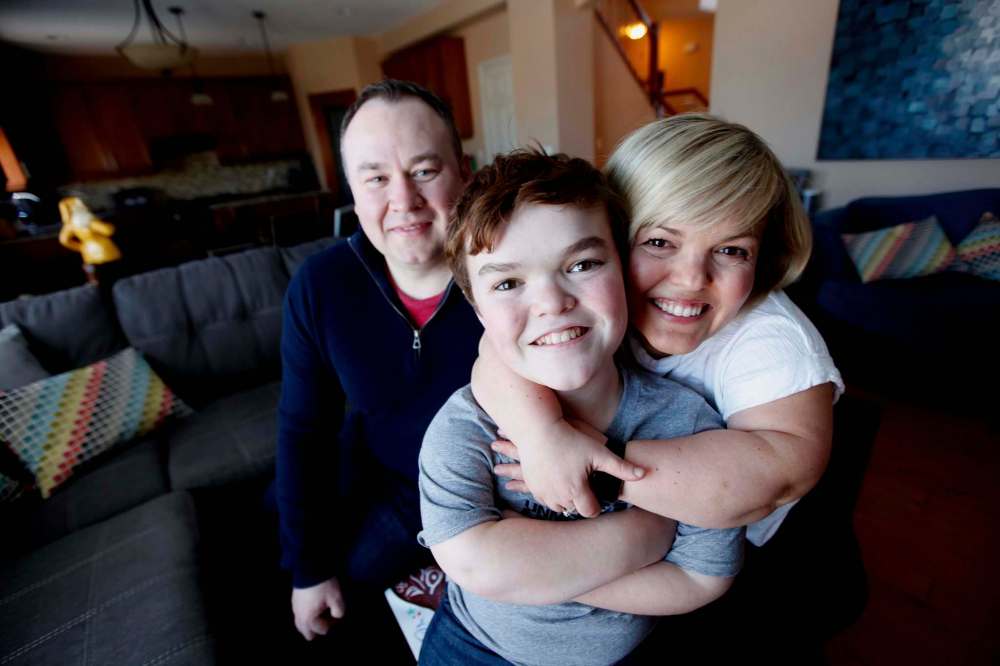She’s kind of a big deal 'Totally rad' mom making a difference, bringing long overdue change for little people in Manitoba
Read this article for free:
or
Already have an account? Log in here »
To continue reading, please subscribe:
Monthly Digital Subscription
$0 for the first 4 weeks*
- Enjoy unlimited reading on winnipegfreepress.com
- Read the E-Edition, our digital replica newspaper
- Access News Break, our award-winning app
- Play interactive puzzles
*No charge for 4 weeks then price increases to the regular rate of $19.00 plus GST every four weeks. Offer available to new and qualified returning subscribers only. Cancel any time.
Monthly Digital Subscription
$4.75/week*
- Enjoy unlimited reading on winnipegfreepress.com
- Read the E-Edition, our digital replica newspaper
- Access News Break, our award-winning app
- Play interactive puzzles
*Billed as $19 plus GST every four weeks. Cancel any time.
To continue reading, please subscribe:
Add Free Press access to your Brandon Sun subscription for only an additional
$1 for the first 4 weeks*
*Your next subscription payment will increase by $1.00 and you will be charged $16.99 plus GST for four weeks. After four weeks, your payment will increase to $23.99 plus GST every four weeks.
Read unlimited articles for free today:
or
Already have an account? Log in here »
Hey there, time traveller!
This article was published 22/03/2019 (2457 days ago), so information in it may no longer be current.
She stands only four feet tall, but Samantha Rayburn-Trubyk has a towering dream — making the world a better place.
As president of the advocacy group Little People of Manitoba, Rayburn-Trubyk is fighting to make our society kinder, gentler and more accepting of people living with dwarfism, including her and her 13-year-old son, Yale.
“The ultimate goal for us is to make the next generation of little people — like Yale — have so much self-love and be comfortable in who they are that they can go out in the world and do great things,” says Rayburn-Trubyk, 37, a labour relations manager with Price Industries, a heating, air conditioning and ventilation equipment manufacturer.
Chatting around the kitchen table in the family’s Southview Crescent home, she is charming, talkative and outgoing, with an infectious sense of humour: at one point, giggling, she says, “I always thought that I was four-foot-one, but, sadly, Disneyland told me otherwise.”
Her style isn’t to bash people over the head for being intolerant, but to educate them about the issues.

In 2016, Rayburn-Trubyk, her husband Ryan and son were eating dinner at a restaurant near a loud woman and her two adult daughters. “They were right across from us and they were laughing and talking and somebody used the M-word (midget),” she recalls.
Instead of confronting them over a term that is deeply insulting to little people, they turned it into a teaching moment. “So we quietly told the server we would pay for their meal, and then we left,” she says. “We didn’t confront them. I didn’t want it to be their story.
“I want to be able to take the high road because I think that’s more impactful. That will make the biggest difference… I don’t want to be seen as that person — ‘Oh, everything bothers her.’ I want to fight for the things that are important and laugh off the things that aren’t.”
Rayburn-Trubyk’s parents and siblings are all of average height, as is her husband. She and her son both live with the most common form of dwarfism, achondroplasia, a bone-growth disorder in which people have an average-sized torso but shorter limbs.
“It’s a gene that I inherited from one of my parents and I passed it down to Yale,” she says. “When I’m sitting, you’ll see I’m generally the same size as most people. But when I’m standing, that’s when you notice it.”
She became president of the 38-year-old advocacy organization in 2015, and has quickly amassed an impressive string of achievements.
“The ultimate goal for us is to make the next generation of little people… have so much self-love and be comfortable in who they are that they can go out in the world and do great things.”
In 2017, Little People helped persuade Manitoba MLAs to unanimously support a private member’s bill from Liberal MLA Jon Gerrard declaring Oct. 25 as Dwarfism Awareness Day in the province.
“We’re the only province in Canada that has this day of recognition,” she says with pride. “I think it’s amazing. It speaks volumes to where we live. When I talk about it, sometimes I’m speechless.
“We now have our sights set on taking Dwarfism Awareness Day national. We’re working with our MP, Terry Duguid (Liberal, Winnipeg South), on doing that. We’re on to the next challenge and helping some other provinces do the great things we’re doing. We’re leading the way. That’s how I am. I want to see what we can do next to change the world.”
In January, she sat down with representatives from 17 sports organizations and Sport Manitoba to discuss her No. 1 issue — eradicating the use of the term “midget” to describe an age-division classification.
Rayburn-Trubyk explained why the derogatory term is hurtful to little people, regardless of its intended meaning — typically to describe players between the ages of 15 and 17 — in a sports context.

“I truly believe a lot of people don’t understand why it’s offensive,” she says. “If we can provide some education, people are more likely to come on board…. It comes from the word midge — a fly that spreads disease.
“It was used in the ‘freak show’ era by P.T. Barnum, who would put little people on display for money. It’s deeply offensive. We’ve spent so many years trying to get rid of stereotypes. That word takes us back to being looked at for money or being put on display for someone else, and that’s not cool. It’s not acceptable today.”
The campaign quickly bore fruit — the Midget Football League of Manitoba announced in February it will drop “midget” from its name and undergo a rebranding for the 2020 season. That came about a week after Basketball Manitoba’s board passed a motion to no longer use the term to describe an age division of play.
Hockey Manitoba executive director Peter Woods told the CBC he sees no reason not to make the change, but the organization is waiting for Hockey Canada to discuss the matter at meetings in May. It’s expected the derogatory term will be dropped before next hockey season.
“Hockey is the big one that needs to change,” Rayburn-Trubyk insists. “It sounds like they are onboard, but they’re awaiting direction from their national body. It (midget hockey) is so well-known and so many kids participate.”
“I want to be able to take the high road because I think that’s more impactful. That will make the biggest difference… I don’t want to be seen as that person– ‘Oh, everything bothers her.’ I want to fight for the things that are important and laugh off the things that aren’t.”
The success of that campaign is encouraging for the president of Little People of Manitoba, but she knows there’s a long way to go. Her organization currently has about 60 members, about 20 per cent of whom are little people.
“In Manitoba, there are a lot of little people who are not connected to the group, and that’s something we’d love to see change,” she says. “The more, the merrier, the more we can help people.”
Her son, Yale, the first second-generation member of Little People, talks matter-of-factly about the challenges of his short stature, and how he’s been inspired by his mother’s advocacy work.
“I think it’s really good,” says the Grade 7 student at the Gray Academy of Jewish Education, who is the same height as his mother. “I play baseball and I was getting worried that when I got to the ‘midget’ stage, people were going to make fun of me.
“Now that my mom has dealt with it, it’s fine. She’s also totally rad. I think she is pretty cool.”
Yale says he has faced bullying, but “people don’t really treat me differently. I feel like I’m the same as them. Nobody really asks about my height anymore.”
Ryan, 38, manager of the Transcona Walmart store, has been impressed by the difference his wife is making.
“I think she’s fantastic,” he says. “I’m surprised by her work ethic and how selfless she is. She always has a goal she’s working towards and it’s always for the betterment of others.
“She doesn’t just say she wants to leave the world a better place for her son, she delivers on it.”
“There’s a lot more to do, but nobody said it would be easy. If at the end of it, I’ve made a tiny positive impact, I’d call it a success.”
The couple are longtime friends who re-connected and got married in 2012 after Samantha’s first marriage ended. They are used to getting their share of stares in public. “When an average-sized person and a littler person get married, they’re considered an interspatial couple,” Ryan says, laughing.
Adds Rayburn-Trubyk: “When he introduces me as his wife, it’s always like, ‘Oh!’ That look of surprise. Friendly, but shocked.” But discrimination is not a daily battle in this city, she says. “Generally in Winnipeg, there’s a lot of love. We live in a really great city.”
In an opinion piece she wrote for the Free Press in 2018, she expressed concern that society was becoming more intolerant and people were more apt to say whatever popped into their heads, regardless of how offensive it might be.
Today, fresh from several victories, she’s feeling a bit more upbeat about the future. “I think the biggest issue we’re working towards is becoming a fully inclusive society. Not being seen for height first. Not being identified by the size we are, but by what we bring to the table,” she says.
“There’s a lot more to do, but nobody said it would be easy. If at the end of it, I’ve made a tiny positive impact, I’d call it a success.”
doug.speirs@freepress.mb.ca
Little people online
You can find out more about the advocacy group Little People of Manitoba by visiting littlepeoplemanitoba.wordpress.com.
They’re always looking for new members, and donations are welcome, too.

Doug has held almost every job at the newspaper — reporter, city editor, night editor, tour guide, hand model — and his colleagues are confident he’ll eventually find something he is good at.
Our newsroom depends on a growing audience of readers to power our journalism. If you are not a paid reader, please consider becoming a subscriber.
Our newsroom depends on its audience of readers to power our journalism. Thank you for your support.










